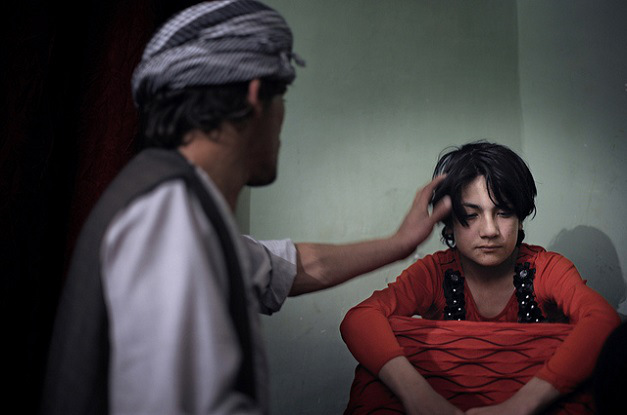US Soldiers Instructed Not To Act Against Child Abuse By Afghan Police
The shocking practice of bacha bazi

NEW DELHI: The United States Defence Department is facing mounting criticism over recent reports that indicate that American soldiers and marines stationed in Afghanistan were instructed to overlook incidents of sexual abuse of children by Afghan allies.
The New York Times quoted a marine’s father saying that his son told him about Afghan police officers sexually abusing boys they had brought to the base. “At night we can hear them screaming, but we’re not allowed to do anything about it,” the Marine’s father, Gregory Buckley Sr., recalled his son, Lance Cpl. Gregory Buckley Jr. -- who was shot at the base in 2012 -- telling him. He urged his son to tell his superiors. “My son said that his officers told him to look the other way because it’s their culture,” the Times quotes.
The Times reports quotes other officials who reaffirm the policy. “The reason we were here is because we heard the terrible things the Taliban were doing to people, how they were taking away human rights,” said Dan Quinn, a former Special Forces captain who beat up an American-backed militia commander for keeping a boy chained to his bed as a sex slave. “But we were putting people into power who would do things that were worse than the Taliban did — that was something village elders voiced to me.”
Further, the report notes that whilst the policy of ignoring child sexual abuse by their Afghan allies is coming under new scrutiny, service members like Captain Quinn have faced discipline, even career ruin, for disobeying it. Captain Quinn was relieved of his command and pulled from Afghanistan; he has since left the military.
The US military, it seems, is also trying to forcibly retire Sgt. First Class Charles Martland, a Special Forces member who had aided Captain Quinn in beating up the alleged offender.
Although the revelations are shocking, the practice of ‘Bacha Bazi’ (literally "playing with boys"; from ??? bacha, "child", and ???? b?z?, "game") is a slang used to refer to a common practice in Afghanistan -- that of peodofilia involving powerful men and their adolescent boy conscripts. Reports indicate that the practice has grown since 2001. The Taliban had a deep aversion toward the practice, and had made it punishable with death. After the US invasion, when the former mujahideen commanders ascender to power with the Taliban’s ouster, they brought with them a rekindled culture of bacha bazi. It wouldn’t be far fetched to assume that the practice isn’t limited just to the military, with former warlords now dominating a range of powerful positions -- governors, line ministers, police chiefs, and politicians.
A report in Foreign Policy authored by Chris Mondloch confirms the above. Mondloch writes: “Since its post-2001 revival, bacha bazi has evolved, and its practice varies across Afghanistan. According to military experts I talked to in Afghanistan, the lawlessness that followed the deposing of the Taliban’s in rural Pashtunistan and northern Afghanistan gave rise to violent expressions of pedophilia. Boys were raped, kidnapped, and trafficked as sexual predators regained their positions of regional power. As rule of law mechanisms and general order returned to the Afghan countryside, bacha bazi became a normalized, structured practice in many areas. Many "chai boys" are now semi-formal apprentices to their powerful male companions. Military officials have observed that Afghan families with an abundance of children are often keen to provide a son to a warlord or government official – with full knowledge of the sexual ramifications – in order to gain familial prestige and monetary compensation. Whereas bacha bazi is now largely consensual and non-violent, its evolution into an institutionalized practice within rural Pashtun and Tajik society is deeply disturbing.”
The point of ‘bacha bazi’ evolving into an institutionalised practice is evident from an email response sent by spokesman for the American command in Afghanistan, Col. Brian Tribus to the New York Times. The colonel wrote: “Generally, allegations of child sexual abuse by Afghan military or police personnel would be a matter of domestic Afghan criminal law.” He added that “there would be no express requirement that U.S. military personnel in Afghanistan report it.” An exception, he said, is when rape is being used as a weapon of war.
This policy of non-intervention has played a pivotal role in institutionalising bacha bazi. The Times quotes a former Marine lance corporal saying, “The bigger picture was fighting the Taliban… It wasn’t to stop molestation.”
It is worth remembering that the US justified its invasion of Afghanistan partly because of the repressive regime instituted by the Taliban -- but is the new regime less repressive? The above reports point toward a disturbing and bleak answer.



